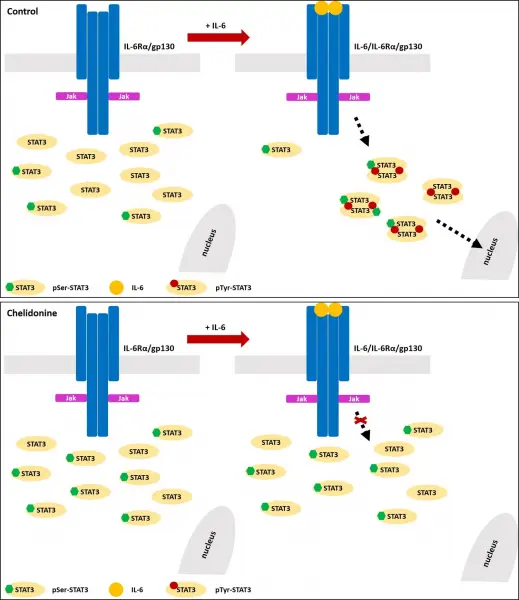
István Csomós, Péter Nagy, Csenge Filep, István Rebenku, Enikő Nizsalóczki, Tamás Kovács, György Vámosi, László Mátyus, Andrea Bodnár. Int. J. Mol. Sci. 2021, 22(23), 12974; doi: 10.3390/ijms222312974
Herb-derived natural products, interfering with STAT3 signaling, are promising therapeutic agents in cancer treatment. STAT3 is a transcription factor that regulates various cellular processes with oncogenic potential, thereby promoting oncogenesis when activated uncontrolled. IL-6, a major activator of STAT3, is present in elevated concentrations in uveal melanomas, suggesting contribution of dysregulated STAT3 activation to their pathogenesis. STAT3 activation is mediated by tyrosine phosphorylation, triggering dimerization and nuclear translocation. STAT3 also contains a serine phosphorylation site, with a postulated regulatory role in STAT3 activation and G2/M transition. Here we demonstrated that chelidonine, the major alkaloid component of Chelidonium majus L, amplified the efficiency of constitutive serine phosphorylation, but abrogated IL-6-induced activation and nuclear translocation of STAT3 in human uveal melanoma cells. Both effects were restricted to only a fraction of cells in an all-or-none fashion. While the loss of IL-6 inducible STAT3 activation was permanent during the time course of the experiment, elevation of pSer-STAT3 level appeared to be a transient effect. A partial overlap could be observed between the affected subpopulations; however, no direct connection could be proven. Our results raise the applicability of chelidonine in the combinational or multimodal therapies of uveal melanomas.